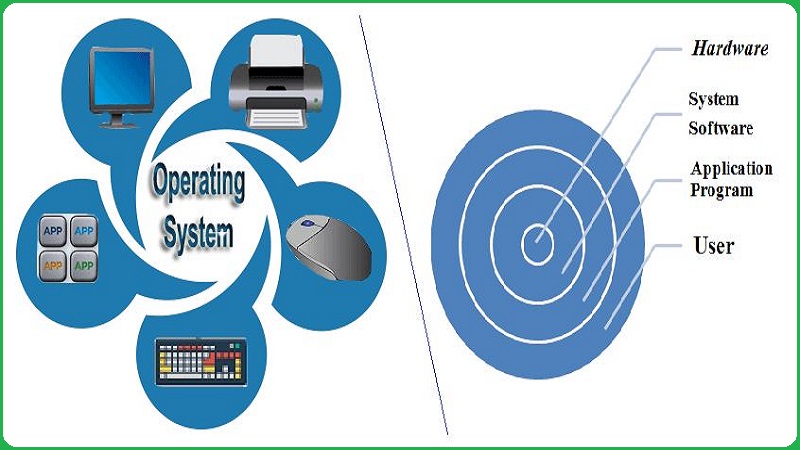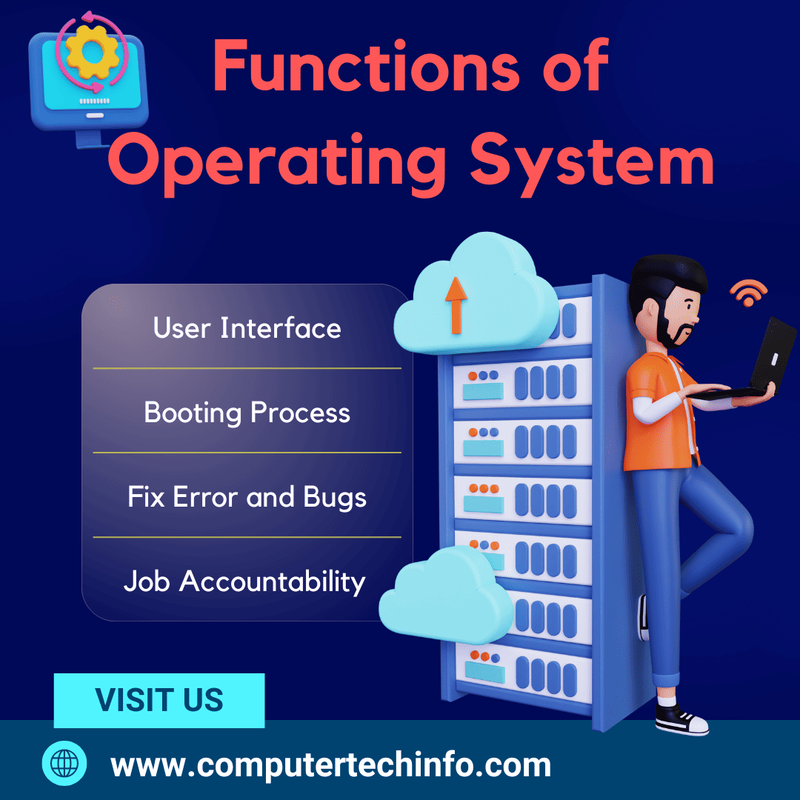Introduction and Role of Operating System
Operating system plays the role likes as software component of computer system that is responsible for the management of all resources of computer system.
It generates the friendly environment for all applications and software that installed on the computer because it allows the access to them for performing their tasks effectively.
So, at least one operating system must installed on all types of computers.
Functions of Operating System
In this section, we will explain of various different major and basic functions of operating system (OS); such as –
- User Interface
- Booting Process
- Protection
- Maintain System Performance
- Job Accountability
- Error Detection and Removal
- Fix Error and Bugs
- Create Coordination
- Memory Handler
- Process Handler
- I/O Device Management
- File Management
- Command Interpreter
- Time Sharing System
- Deadlock Presentation
- Interrupt Management
- Virtual Storage Space
- Printing Controlling
User Interface
Operating system provides the user friendly interface, on which users can control all activates of system such as how to insert input data and how to display result on the computer screen.
So operating system has two types of interfaces like as
Graphic Interface – In which, O/S offers visual interface for interacting to computer system.
Command Interface – In which, O/S offers the command line interface; it means users can interact with computer by typing commands.
Booting Process
When we turn on the computer system then it starts the booting process. In which, it monitors the entire activities of computer system that it ready to working position or not.
Protection
Operating system contains the authentic passwords to protect entire data of system and other their internal memories. It also provides the protection from unwanted activities for getting access of its programs and data as well.
Maintain System Performance
Operating system monitors the entire system health, and it helps to increase the overall performance of system.

It tries to improve the response time in between service request and system response day by day.
Job Accountability
Operating system helps to track of all time and their resources that used by several tasks and multiple users. This is because; these types of information are very useful for specific user or group of user.
Also Read: What is Page Fault? Page Fault Handling in OS
Error Detection and Removal
Operating system frequently monitors the entire system to identify the errors and bugs.
Fix Error and Bugs
When operating system finds any errors or bugs then it tries to fix immediately without losing any type of data.
Create Coordination
Operating system maintains the coordination between the users and other software such as interpreters, compilers, assemblers, and more.
Memory Handler
Operating system manages the entire memory of computer system such as Main Memory, Virtual Memory, and Cache Memory. Primary memory designs with large array of bytes, and its every bytes is allotted a piece of address. CPU can directly access of this memory, because all programs which are to execute. They get loading into primary memory. Now user programs can use these types of memory smoothly.
Process Handler
Operating system has a particular process model for managing the all processes is known as “Process Scheduling”. In this model, operating system can take decision that how much processing time are required for every process, and O/S monitors all status of processes. If any programs, which can be performed this types of tasks is called the “Traffic controller”.
I/O Device Management
Operating system is capable to manage all devices communication with their drivers respectively. It monitors all Input/output devices, which are connected to computer system.
Input/output controller takes responsibility for each device, and it can take decision that which process gets access to particular device and for how much time. Some devices are de- allocated which are not needed for longer time.
File Management
A file system made up into directories form for improving its efficiency and better usage. These types of directories may contain another sub directories and files. It monitors all activates related to where all information keep saving, user access setting, all status of each files, and more. So this type of process is known as “File System”.
Command Interpreter
Command interpreter plays vital role in the operating system family. This is because; it fetches all commands that written by user at own terminal, interpret of them and translate them into machine language that are easily understand by computer hardware. Every command interpreters design for all operating system according O/S’s functionalities.
Time Sharing System
Operating system handles the CPU’s time at the effective manner. Time sharing determines the all CPU requests that produced by the higher priority processes. When multiple processes try to competing for CPU time at the same level priority, then CPU time divides into small segments that introduced by time slice. Now they pass from process to process according the round robin model.
Deadlock Presentation
When multiple processes share more than two resources, so they cannot continuously because resources needed by one process are held by another. if this condition arise then it is known as deadlock. So operating system tries that this above problem does not create during the resources allocation.
Also Read: Time Sharing Operating System and its Examples, Advantages, Disadvantages
So, we have to use some deadlock handling techniques such as Deadlock Prevention, Deadlock Detection and Recovery, Deadlock Avoidance, Deadlock Ignorance, and Ostrich Algorithm.
Interrupt Management
When any device or program require the CPU resources then they arise the some signals for creating the CPU attention, this type of signals is known as the “Interrupt signal”. Operating systems identify the type of interrupt signals and its priority, and then send them for performing the operations.
Virtual Storage Space
During execution time, if any program has large size to Primary Memory of the computer system, then operating system needs the reserve area in the auxiliary memory, so you can can say it the “Virtual Memory“. Due to virtual storage, OS can execute large program but its execution speed gets slow.
Printing Controlling
Operating system can also control the all printing functions such as if user sends two print commands concurrently, then O/S print them separately instead of mix data.
Needs of Operating System
Operating system has ability to manage all resources, overcome conflictions, and it helps to optimize the entire performance of machine.
Also Read: Single User Operating System with its Examples
OS allows all users to make communication between their install applications.
Operating system plays the vital role to load programs while turn on system, and it transfers loaded programs disk to main memory, manipulate them and finally produce result.
Operating system allows the multiple users to run different applications in common space with using shared memory concurrently.




